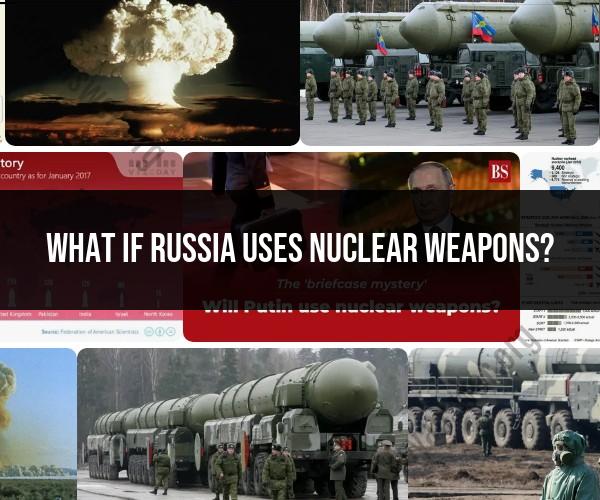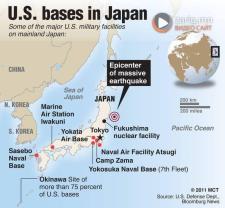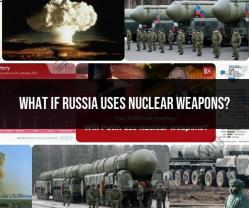What if Russia uses nuclear weapons?
The use of nuclear weapons by any country, including Russia, has severe and far-reaching implications, not only for the country using them but for the global community as a whole. Here are some of the implications and consequences of Russia using nuclear weapons:
Humanitarian Catastrophe: The immediate impact of a nuclear strike would be a catastrophic loss of life and immense suffering. The explosion, heat, and radiation from a nuclear bomb can cause mass casualties, severe injuries, and long-term health problems.
Environmental Devastation: Nuclear explosions can lead to long-lasting environmental damage, including radiation contamination, which can persist for years or even decades. This contamination can have significant health and ecological consequences.
Global Fallout: A nuclear conflict could have a global impact, as radioactive particles can be carried by winds and spread far beyond the immediate blast zone. This could affect people and ecosystems in distant regions.
International Outrage: The use of nuclear weapons is widely condemned by the international community. It would lead to immediate international outrage and condemnation, likely resulting in sanctions, isolation, and diplomatic consequences for the nation responsible.
Escalation Risk: The use of nuclear weapons increases the risk of further escalation and retaliation by other nuclear-armed countries. This could potentially lead to a full-scale nuclear war, with catastrophic consequences.
Economic Disruption: A nuclear conflict would disrupt global economic systems, trade, and supply chains, causing economic hardship and uncertainty worldwide.
Political Isolation: The country using nuclear weapons would face political and diplomatic isolation. Other nations may cut off diplomatic relations, impose sanctions, and take actions to isolate the aggressor.
Military Response: Other countries may respond militarily to the use of nuclear weapons, which could further escalate the conflict.
Humanitarian Response: The international community would be compelled to respond with humanitarian aid to assist the victims of a nuclear strike.
Long-Term Health Effects: Survivors of a nuclear attack would face long-term health effects, including an increased risk of cancer and other radiation-related illnesses.
Psychological Impact: The psychological impact of a nuclear strike, both on those directly affected and on the global population, would be profound, leading to fear, anxiety, and trauma.
Erosion of Nuclear Non-Proliferation Efforts: The use of nuclear weapons by any nation undermines international efforts to prevent the proliferation of nuclear weapons and promotes disarmament.
It is important to note that the use of nuclear weapons is governed by international treaties and agreements, including the Treaty on the Non-Proliferation of Nuclear Weapons (NPT). The use of such weapons is widely considered a last resort due to the catastrophic consequences and the potential for global conflict. The hope is that diplomacy and international cooperation can prevent the use of nuclear weapons and promote disarmament. It's in the interest of all nations to work towards a world without nuclear weapons to avoid these dire consequences.
Exploring the Implications of Russia's Potential Use of Nuclear Weapons
The potential use of nuclear weapons by Russia would have far-reaching and devastating implications. The immediate consequences of a nuclear attack would include widespread death and destruction, as well as a significant disruption to global infrastructure and supply chains.
A nuclear conflict would also have a number of long-term consequences, including:
- Environmental damage: Nuclear explosions can release radioactive material into the atmosphere, which can contaminate soil and water supplies. This can lead to long-term health problems for people exposed to the radiation.
- Global economic fallout: A nuclear conflict would likely lead to a global economic recession. This is because businesses would be reluctant to invest in countries that are at risk of nuclear attack.
- Increased risk of nuclear proliferation: If Russia were to use nuclear weapons, it could lead other countries to develop nuclear weapons programs of their own. This would increase the risk of a future nuclear conflict.
Nuclear Deterrence and Geopolitical Tensions: What's at Stake
Nuclear deterrence is a strategy that relies on the threat of nuclear retaliation to prevent other countries from using nuclear weapons. This strategy has been successful in preventing a nuclear war between the United States and Russia for over 70 years.
However, the current geopolitical tensions between Russia and the West are putting the principle of nuclear deterrence to the test. Russia has repeatedly threatened to use nuclear weapons in response to NATO expansion and Western support for Ukraine.
If Russia were to use nuclear weapons, it would be a major escalation of the conflict in Ukraine and could lead to a direct military confrontation between Russia and NATO. This could lead to a full-scale nuclear war.
The Role of International Agreements in Preventing Nuclear Conflict
A number of international agreements have been signed in an effort to prevent nuclear conflict. These agreements include:
- The Treaty on the Non-Proliferation of Nuclear Weapons (NPT): The NPT is a treaty that prohibits the spread of nuclear weapons to non-nuclear weapon states. It also requires nuclear weapon states to work towards nuclear disarmament.
- The Comprehensive Nuclear-Test-Ban Treaty (CTBT): The CTBT is a treaty that prohibits all nuclear weapon test explosions.
- The New START Treaty: The New START Treaty is a treaty between the United States and Russia that limits the number of nuclear warheads and delivery systems that each country can deploy.
These agreements play an important role in preventing nuclear conflict. However, they are not perfect and can be violated by countries that are willing to do so.
Civilian Preparedness in the Event of Nuclear Warfare
In the event of a nuclear war, it is important for civilians to be prepared. This includes having a plan for what to do in the event of an attack, as well as having a stockpile of food and supplies.
Here are some tips for civilian preparedness in the event of nuclear warfare:
- Have a plan: Create a plan for what to do in the event of a nuclear attack. This plan should include where to go for shelter, how to communicate with loved ones, and how to obtain food and water.
- Stockpile food and supplies: Have a stockpile of food and supplies that can last for at least two weeks. This should include non-perishable food, water, medicine, and other essential items.
- Stay informed: Stay informed about the latest developments in the geopolitical situation. This will help you to make informed decisions about your preparedness.
Global Response to a Nuclear Conflict Scenario
A global response to a nuclear conflict scenario would be complex and challenging. The international community would need to work together to provide humanitarian assistance to the victims of the attack, as well as to prevent the spread of radioactive material.
The international community would also need to work together to address the long-term consequences of a nuclear conflict, such as the environmental damage and the global economic fallout.
A nuclear conflict would be a tragedy for the world. However, it is important to be prepared for the possibility of such a conflict. By understanding the implications of a nuclear war and by taking steps to prepare, we can help to minimize the damage.
In addition to the above, here are some other key points to consider:
- The use of nuclear weapons by Russia would be a violation of international law and would have a devastating impact on global peace and security.
- The international community must work together to prevent Russia from using nuclear weapons and to hold it accountable if it does.
- It is important to strengthen nuclear non-proliferation and disarmament efforts to reduce the risk of nuclear conflict in the future.
- We must also invest in civilian preparedness measures to ensure that we are ready to respond to a nuclear attack, if necessary.




